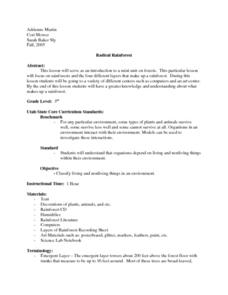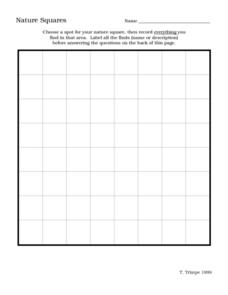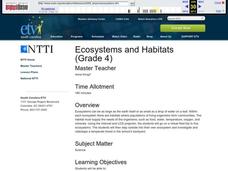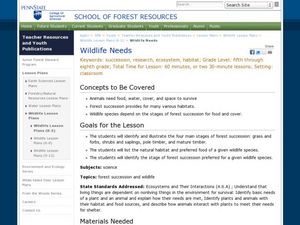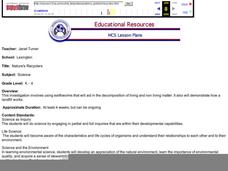Curated OER
Environmental Conditions: Friend or Foe
Students research and answer questions on how organisms are classified and how their needs are met through their environment. They work in small groups and create a poster, chart, rap, PowerPoint, or brochure demonstrating how organisms...
Curated OER
Creature Features
Young scholars examine why certain animals live in only specific places throughout the world. Using animals, they classify them based on their characteristics and identify their basic needs. They also observe and compare the life cycles...
Curated OER
Inside the Egg, Hatching Chickens
Students conduct an egg candling activity to show the life inside a fertile egg. Students discuss the needs the egg has of the hen, as well as similarities and differences between plants and animals. Students complete a life cycle wheel...
Curated OER
Flour Beetles
Learners observe life stages in flour beetles and graph the results. They write a summary report.
Curated OER
Physical Science: Solar Energy
Students review and discuss how Solar energy and electricity produce light and heat. They create a photo/picture journal and include pictures taken during solar energy activities to a PowerPoint slide presentation.
Curated OER
Ecological Relationships
Middle schoolers identify ecological elements and their factors on species, populations and food webs. They analyze ecosystems for these elements and research how these factors influence species survival rate. Predictions on conditions...
Curated OER
Our Special Planet Earth
Students explore what is special about our planet. They explore the various climates that are found on the planet Earth. Students create an advertisement to convince people why their favorite environment would be the best place to visit.
Curated OER
Radical Rainforest
Third graders examine rainforests and the four different layers that make up a rainforest. They create an advertisement poster advertising a trip to the rainforest, including information concerning why people should visit, as well as,...
Curated OER
Plant Parts
Students create a model of the parts of a plant. After reviewing the parts of a plant and their function, students working in groups, construct a plant using various provided materials. Their models are labeled and presented to the...
Curated OER
Nature Squares
In this nature observation worksheet, students set up a grid on a small plot of land and record all biotic and abiotic items in the grid. They complete 5 short answer questions based on their observations.
Curated OER
Organisms and Their Environment
Students explore Earth's biosphere. In this biosphere lesson plan, students participate in group activities regarding biotic and abiotic factors, population density, and species' habitats.
Curated OER
Populations and Ecosystems
Sixth graders examine the factors that influence the stability of ecosystems. They construct a miniature ecosystem in a jar that includes plants, small fish, and snails, record the population changes over a period of four weeks, and...
Curated OER
Light the Bulb
Students explore electricity. In this power experiment lesson, students determine what is required for lighting a bulb. Students develop an understanding of open and closed circuits, and how energy is formed
Curated OER
Characteristics of Energy
Students explore Earth science by completing energy worksheets in class. In this energy forms lesson plan, students identify and define a list of energy vocabulary terms and a K-W-L chart. Students view a matter video clip in class and...
Pennsylvania Department of Education
Energy in Motion
Fifth graders explore energy transfer. In this thermal energy lesson, 5th graders stretch rubber bands several times and estimate the band's temperature change. Students identify this action as an example of thermal energy. Students...
Curated OER
Ecosystems and Habitats
Fourth graders go on a virtual field trip to five ecosystems. They investigate and videotape a temperate forest in the school's backyard.
Curated OER
Wacky Wildlife World
Fourth graders research organisms in the environment in Kentucky and create brochures for the local area wildlife reserves. Individuals create brochures that include information on habitat, body characteristics, scientific class, role...
Curated OER
RAINFOREST Mini-Unit
Students engage in a variety of activities to investigate the subject of rainforests. The lesson focuses on the different floors of the rainforest and the types of life that exists on each.
Curated OER
Ecology 8 Land Biomes
High schoolers identify and describe the main features of one land biome. After researching what a biome is, they give various examples of biomes around the world and in their backyards.
Curated OER
Tree Growth
Students fill in a diagram. In this tree growth lesson, students view a model of a tree, learn how trees grow and explore the layers of a tree. Students complete a diagram where they label the layers of a tree.
Curated OER
Wildlife Needs
Students identify the wildlife needs in a specific setting. For this wildlife needs lesson, students identify and illustrate the four stages of forest succession. Students list the natural habitat and food for a given species. Students...
Curated OER
Mammal Morphology: bats and people
In this mammals worksheet, students compare and contrast the physical characteristics of bats and people by filling out a chart. Students complete 17 rows in the chart and answer 3 short answer questions.
Curated OER
Beneficial Bug Scavenger Hunt
Students identify several beneficial insects and spiders, including predators and pollinators. They search an outdoor environment and record numbers and types of beneficial insects and spiders that they discover.
Curated OER
Nature's Recyclers
Learners create environments to demonstrate how earthworms interact with their surroundings.
Other popular searches
- Living and Nonliving Things
- Living vs Nonliving Things
- Living or Nonliving Things
- Living Nonliving Things
- Living/nonliving Things









